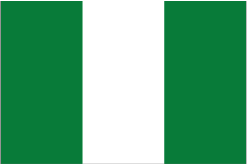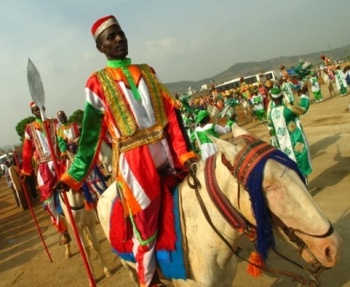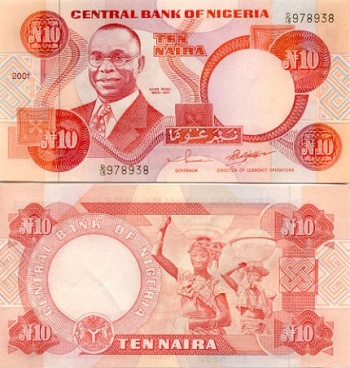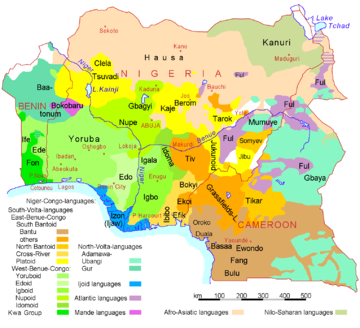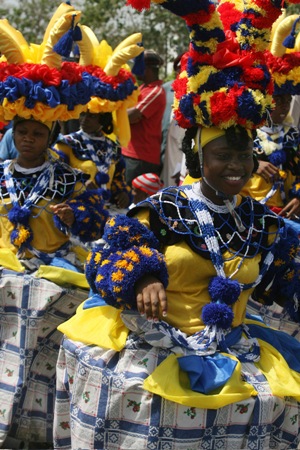Nigeria
From The Peopling of New York City
Contents |
Location
Nigeria is located in West Africa and shares land borders with the Republic of Benin in the west, Chad and Cameroon in the east, and Niger in the north. Its coast lies on the Gulf of Guinea, part of the Atlantic Ocean, in the south.
History
Nigeria is a country with a long history. One-third larger than Texas and the most populous country in Africa, Nigeria is situated on the Gulf of Guinea in West Africa. Nigeria’s neighbors are Benin, Niger, Cameroon, and Chad.
The first inhabitants of what is now Nigeria were the Nok people (500 B.C.–c. A.D. 200). The Kanuri, Hausa, and Fulani peoples soon after migrated there. Islam was introduced in the 13th century, and the empire of Kanem (present day Chad and Libya) controlled the area from the end of the 11th century to the 14th. Between the 14th century, and the beginning of the 19th century, the slave trade was important in Nigeria’s history.
In the 19th century, 30 percent of all slaves sent across the Atlantic came from Nigeria. Over the period of the whole trade, more than 3.5 million slaves were shipped from Nigeria to the Americas. Most of these slaves were Igbo and Yoruba, with great concentrations of Hausa, Ibibio, and other ethnic groups.
The Fulani empire ruled the region from the beginning of the 19th century until the British annexed Lagos in 1851 and seized control of the rest of the region by 1886. It formally became the Colony and Protectorate of Nigeria in 1914. During World War I, native troops of the West African frontier force joined with French forces to defeat the German garrison in the Cameroons.
After an independence struggle, on Oct. 1, 1960, Nigeria gained independence, becoming a member of the Commonwealth of Nations and joined the United Nations. The country was organized as a loose federation of self-governing states under the leadership of Abubakar Tafawa Balewa. With independence the new nation faced the enormous task of unifying a country with 250 ethnic and linguistic groups.
President Gowon nine-year rule was ended in 1975 by a bloodless coup that made Army Brigadier Muritala Rufai Mohammed the new chief of state. The return of civilian leadership was established with the election of Alhaji Shehu Shagari as president in 1979. An oil boom in the 1970s aided the economy and by the early 1980s Nigeria was considered an exemplar of African democracy and economic well-being. During the 1970s, Nigeria had the 33rd highest per-capita income in the world, but by 1997 it had dropped to the 13th poorest. Nigeria had established itself as West Africa’s superpower, and as the leader of a multination peacekeeping force, ECOMOG, intervened in the civil wars of Liberia and Sierra Leone. These war efforts were costly and unpopular with its own people. The citizens of Nigeria felt the economic resources that were limited were being unnecessarily exhausted.
Nigeria's stability has been threatened repearedly by fighting between fundamentalist Muslims and Christians over the spread of Islamic law (sharia) across the heavily Muslim north. One-third of Nigeria's 36 states are ruled by sharia law. More than 10,000 people have died in religious clashes since military rule ended in 1999.
During the April 2007 national elections, which were the country’s first transition from one democratically elected president to another were marred by widespread allegations of fraud, ballot stuffing, violence, and chaos. Just days before the election, the Supreme Court ruled that the election commission’s decision to remove Vice President Atiku Abubakar, a leading candidate and a bitter rival of President Olusegun Obsanjo, from the ballot was illegal.
Ballots were reprinted, but they only showed party symbols rather than the names of candidates. Umaru Yar’Adua, the candidate of the governing party, won the election in a landslide, taking more than 24.6 million votes. Second-place candidate Muhammadu Buhari tallied only about 6 million votes. International observers called the vote flawed and illegitimate. An election tribunal ruled in February 2008 that although the election was indeed flawed, the evidence of rigging was not substantial enough to overturn the election results. Yar'Adua's inauguration (May 2008) marked the first transition of power between two elected civilian presidents in Nigeria's post-colonial history.
Demographics
- Population - 135,031,164 (as of 1999)
- Age structure - 0-14 years: 42.2% 15-64 years: 54.7% 65 years and over: 3.1%
- Population Growth Rate - 2.379% (2007 est.)
- Birth Rate - 40.2 births/1,000 population (2007 est.)
- Death Rate - 16.68 deaths/1,000 population (2007 est.)
- Infant mortality rate - total: 95.52 deaths/1,000 live births
- Life expectancy at birth (total population) - 47.44 years
- Religions - Muslim 50%, Christian 40%, indigenous beliefs 10%
- Languages - English (official), Hausa, Yoruba, Igbo (Ibo), Fulani
- Literacy definition: age 15 and over can read and write (total population) - 68%
- HIV/AIDS - adult prevalence rate: 5.4% (2003 est.)
- HIV/AIDS - people living with HIV/AIDS: 3.6 million (2003 est.)
- HIV/AIDS - deaths: 310,000 (2003 est.)
Languages
The country of Nigeria is rich, not only in natural resources and potential, but also in languages and cultures. English, being the official language in Nigeria, is widely used for education, business transactions and for official purposes. However, it remains an exclusive preserve of a small minority of the country's urban elite, and is not spoken in rural areas. With approximately 75% of Nigeria's population residing in rural areas, the major languages of communication in the country remain indigenous. In Nigeria, tribal languages are commonly used for mass communication and mass media, like television and radio.
According to reference books like the Ethnologue (Grimes ed. 1996) and the Index of Nigerian Languages (Crozier & Blench 1992), there are approximately 500 languages spoken in Nigeria today. There are three main languages, named after the peoples they belong to. They are Yoruba, Ibo (also spelled Igbo), and Hausa. In addition to these, there are many extinct languages, which were once practiced by locals, including Ajawa, Basa-Gumna, Holma, Auyokawa, Gamo-Ningi, Kpati, Mawa, Kubi and Teshenawa. The fact that these dead languages were once additions to the more than 500 languages on Nigeria’s list is a further indication of how linguistically rich the country truly is.
Nigeria's language diversity can be ecompassed into three major branches: The Afro-Asiatic, which is mostly seen in the northeast, the Nilo-Saharan, which derived its title by being obseved in the upper parts of upper parts of the Chari and Nile rivers, and the Niger-Congo. Languages of the Niger-Congo branch can be heard in central and southern Nigeria. Nigeria also has one unclassifiable language called Cen Tuum. It is spoken by a few elders in Gombe State. This increases the diversity of languages, showing that there was a greater variation before the current language families were established.
Furthermore, there is also a variation of English called 'Pidgin English' or 'Broken English'. To offer a few examples: “I'm going” is "I de go", “I wont” is "I no", and “what” is "wetin." Even though this language has no standard orthography, it has become so widespread that it is used in novels, plays, radio, poetry, advertising. This variation of English is another way in which such a vast language variation can be seen in Africa.
The following is a popular song, sung by Evi Edna Ogholi that demonstrates the vast language diversity of Nigeria. Amazingly, about one-quarter of the languages of Africa are native to Nigeria.
The following is a popular song, sung by Evi Edna Ogholi that demonstrates the vast language diversity of Nigeria. Amazingly, about one-quarter of the languages of Africa are native to Nigeria.
One metre --
We travel to Umunede, we go speak Isoko,
We travel to Borno, say na Fulfulde,
We travel to Ughelli, dem go speak Urhobo,
We travel to Buguma, say na Kalabari,
We travel to Kaduna, dem go speak Hausa,
We travel to Okene, dem go speak Ebira,
We travel to Abbi, dem go speak Kwale,
Ogomola, dem go speak Okrika,
One kilometre means another language,
half a kilometre means another language, …
One metre …
We travel to Sokoto, dem go speak Fulani,
We go to Benin City, dem go speak Edo,
We travel to Onitsha, dem go speak Igbo,
We travel to Asaba-Asa, den Bendel we go,
We travel to Gboko, dem say na Tiv,
We travel to Otukpa, dem go speak Idoma,
We travel to Akure, dem go speak Yoruba,
We travel to Ase, dem go speak Aboh,
We travel to Uyo, na Ibibio,
We travel, we travel, we travel travel travel …
All I'm saying, Lingua franca …
One metre …
We travel to Patani, dem go speak Izon,
We travel to Vom, dem go speak Berom,
We travel to Ekpoma, dem go speak Esan,
We travel to Auchi, dem go speak Etsako,
We travel to idah, dem go speak Igala,
We travel to Bida, dem go speak Nupe,
We travel to Ogbakiri, dem go speak IkwereCulture
∙Nigeria has a rich literary history, and Nigerians have authored many influential works of post-colonial literature in the English language, such as Chinua Achebe's novel, "Things Fall Apart," which is the most widely-read book in modern African literature.
∙Nigeria has the second largest newspaper market in Africa (after Egypt) with an estimated circulation of several million copies daily in 2003.
∙Nigerian music includes many kinds of folk and popular music, some of which are known worldwide. Styles of folk music are related to the multitudes of ethnic groups in the country, each with their own techniques, instruments and songs. As a result, many different types of music come from Nigeria.
∙Like many nations, football (American soccer, is Nigeria's national sport. There is also a local Premier League of football. Nigeria's national football team, known as the Super Eagles, has made the World Cup on three occasions.
∙ Nigerian cuisine, like West African cuisine in general, is known for its richness and variety. Many different spices, herbs and flavourings are used in conjunction with palm oil or groundnut oil to create deeply-flavoured sauces and soups often made very hot with chilli peppers.Food plays a vital role in the rituals and traditions of practically ethnic groups in Nigeria. Special ceremonies would be incomplete without its participants sharing in a meal.
•Shaking hands, eating, or passing things with the left hand are intolerable. It is considered an insult if any of the above are carried out with ones left hand; the left hand is said to be reserved for personal toiletries and is considered dirty.
•Nigerian culture gives emphasizes the importance in treating guests with the utmost care and warmth. The hospitality kindness and its of people represents this tradition.
• In a social setting, greetings are of the highest importance. Both a handshake and a long list of well wishes for a counterpart's family are expected when meeting someone. Whether one is talking to a bank teller or visiting a friend, it is considered rude not to engage in a proper greeting before engaging in a conversation.
•Nigerians suffer from widespread disease and unfortunately have a poor health care system. HIV/AIDS, Malaria, parasitic infections, and childhood diseases are widespread throughout the country. Extensive poverty also contributes to the poor level of health care, as many people do not have the means to pay for modern treatments that are too expensive. Corruption at all levels of government is so rampant, that it is difficult for health care funding to trickle down to the average Nigerian.
Bibliography
"History of Nigeria." Encyclopædia Britannica. 2008. Encyclopædia Britannica Online. 12 April 2008 <http://www.britannica.com/EBchecked/topic/414910/history-of-Nigeria>.
http://www.uiowa.edu/intlinet/unijos/nigonnet/nlp/welcome.htm
http://www.uiowa.edu/intlinet/unijos/nigonnet/nlp/welcome.htm
